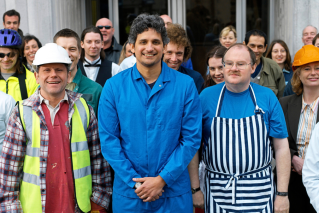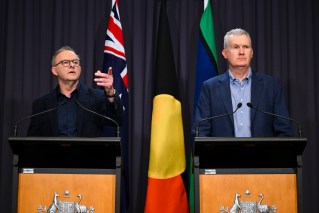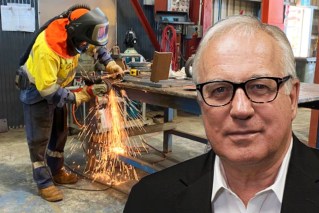Fancy becoming an internet millionaire? Here’s how

Australia’s mining magnates are fabulously wealthy. Some of them, such as Andrew Forrest, even show an admirable propensity to use their fortunes to help those in need.
Not even their biggest supporters, however, could accuse them of being cool. The fluorescent orange safety vests, daggy hard hats, bleak-looking dongas and inhospitable environments that define the nation’s commodities sector don’t exactly inspire legions of Gen Ys to emulation.
When it comes to billionaires that people actually want to be like, no-one does it better than Silicon Valley.
The sliver of San Francisco Bay in California that spawned the home computer, the internet and other associated wonders has at the same time given birth to a compelling culture. Whether it’s the sense of playfulness inherent in innovating with new technology, the relative youth of some of its most successful entrepreneurs, or the the countercultural leanings of many of its biggest idols – Steve Jobs, anyone? – there’s no doubt that armies of hipsters are desperate to buy in.
It’s a movement that has transcended US borders to become a global phenomenon, as home-grown tech millionaires Matt Barrie of Freelancer.com, Shainiel Deo of Halfbrick Studios, and Mike Cannon-Brookes and Scott Farquhar of Atlassian demonstrate.
Unfortunately for most of us, becoming a successful tech entrepreneur is a lot harder than parking yourself at your local Starbucks with a MacBook Pro and a pair of Birkenstocks. So, then, what does it take?
More than just a good idea
Josh Guest, founder and managing director of Melbourne-based app development company b2cloud, said that a lot more is required of would-be entrepreneurs than just a good idea, because most concepts have already been done before in one form or another.
“It all comes down to execution. Thinking about not just the idea, but about how to get the technology to market, how to get your first paying customer, how do you get exposure, marketing, advertising, is it legal, there are all these other things to think about it and plan for,” he said.
“It’s so much more than just the idea.
“There are many ideas out there, but what makes a successful business is a fantastic team,” said Guest. “Always focus on having the best team you can bring together to execute on your idea.”
Matt Barrie, CEO of Freelancer.com, said timing is also important when starting a business.
“Timing, which I believe some people perceive as luck, certainly plays a part in helping your business become successful,” he said.
“Getting the timing right for your business really means your customers are ready to consume whatever it is you are offering, so know your market before starting.”
Barrie founded Freelancer.com, a global online outsourcing and crowdsourcing marketplace, in 2009.
“Whilst a good idea is a great place to start, you may have the best idea in the world, but if no one wants to use your product then you have no business,” he said.
Support is a key ingredient for any start-up
Over the last two years, support for tech start-ups in Australia has expanded rapidly, thanks to growth of business incubators and angel groups.
Tech focused co-work spaces like the York Butter Factory in Melbourne, Fishburners in Sydney and The Typewriter Factory in Hobart offer a lot of support to those looking to develop their ideas, as do business incubators like BlueChilli.
“An incubator is a place where you’d go, you’d apply and say this is my idea,” said Guest.
“They will then provide you with an office space, access to the web, help you network with other business people, get mentoring from professionals and receive a lot of support.”
Guest said it is vital to become involved in the community if you want your start-up to be successful.
“Every single week there are entrepreneur meet-ups where you can go and meet other like-minded entrepreneurs and network with each other,” he said.
“It’s a very tight community and a very important one to get involved with if you want to start a new venture.”
Financing options
While Australia’s burgeoning Internet technology market has seen increased interest from venture capitalists compared with previous years, we still have a long way to go in supporting new tech start-ups.
“In Australia, something we do lack is a place like Silicon Valley, or even Silicon Wadi in Israel,” said Guest.
“Something that we are lacking – and have been for a while – is the ability for start-ups who are in the very early stages to generate funding to get started.
“There are incubators around Australia who sort of help a start up. You apply with your concept, your business idea, but there isn’t the same environment that there is in Silicon Valley.”
Barrie said a solid business plan is one thing that investors look for when providing capital to start-ups, one that clearly states where the revenue stream will be coming from.
“Investors are investing to make a financially sound business and ultimately a profit, not to get a warm and fuzzy feeling from seeing your business succeed,” he said.
According to a 2013 report from PricewaterhouseCoopers, funding for the Australian tech start-up sector is in short supply, with venture capital investment per capita lower than the international standard.
Barrie stated that it is vitally important Australia continues to build up our technology industry, and provide additional support for local start-ups and businesses.
“As a country, we are faced with an incredible opportunity that we are not taking advantage of,” he said.
“Globally, we are in the grips of a technology gold rush and there is no reason we should not reap the benefits here in Australia.”
Australia also falls behind the international average in coordinated support for start-ups, according to EY’s G20 2013 Entrepreneurship Barometer, ranking 15th amongst the G20 countries, although we are improving.
“We have some of the best programmers in the world, we have some of the best engineers in the world, so in terms of talent we are in a really great place. In terms of supporting our talent, it’s improving but it’s not quite there,” added Guest.
Outside investment isn’t always necessary, though. In 2002, Mike Cannon-Brookes and Scott Farquhar bootstrapped their tech start-up Atlassian with a $10,000 credit card loan.
Today, the duo run one of the most successful tech companies in Australia, with over 30,000 customers in over 134 countries and $150 million in revenues for fiscal 2013.
Crowdfunding is another option for start-ups looking for capital. Thanks to crowdfunding websites like Pozible, itself an Australian-based start-up, and Kickstarter, those looking to start their own business can present their idea to the wider community who can then pledge money to a project.
Even if a project isn’t successful at raising the necessary funds, it can be a good way for a start-up to create awareness and market-test their concept.
There has never been a better time
While some of these figures may be depressing, most tech entrepreneurs believe that if there is a time to throw your digital hat into the ring, it’s now.
“Only the technology industry can create such immense wealth and long-term benefit to the world, with such capital efficiency,” said Barrie.
“What other industry could see a 24 year old create a multi-billion dollar business (Facebook) in a matter of years?
“Software and the online world are transforming the way we do business, which is opening up new opportunities for people to start up successful businesses in the digital world.”
“The tools are accessible; the companies to help build the technologies are around, added Guest. “Companies like b2cloud are here to build out these tech start-ups, so now is definitely the time.”








